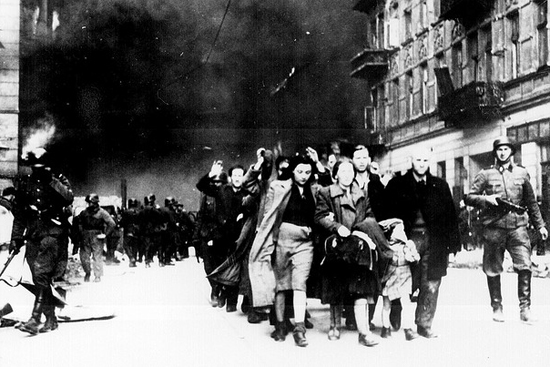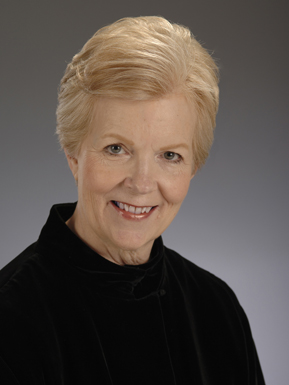BU Symphony Orchestra, Symphonic Chorus at Symphony Hall Tonight
Verdi, Schoenberg pieces reflect Holocaust themes

At Symphony Hall tonight, the BU Symphony Orchestra will perform Arnold Schoenberg’s A Survivor from Warsaw, based on events in the Warsaw Ghetto, pictured in this German photograph taken during the ghetto’s destruction in 1943.
Musically they hail from separate worlds—one composition is 20th century, atonal, and compact, the other 19th century Romantic, reverent, sprawling, and operatic. But the works being performed at the Boston University Symphony Orchestra and Symphonic Chorus concert at Symphony Hall tonight were selected to evoke a common, profound theme: human resilience and tenacity in the face of the Holocaust.
In keeping with the theme of violence—the College of Fine Arts inaugural season keyword initiative—the program pairs Arnold Schoenberg’s A Survivor from Warsaw, being performed by the orchestra under the direction of David Hoose, a CFA professor and director of orchestral activities, and Giuseppe Verdi’s Requiem, with the orchestra joining the chorus under the direction of Ann Howard Jones, a CFA professor of music and director of choral activities. There will be a preconcert lecture by Andrew Shenton, a School of Theology associate professor of music and the James R. Houghton Scholar of Sacred Music.

First performed in 1949, A Survivor from Warsaw tells the story of a ghetto survivor who has been severely beaten and is presumed dead by the Gestapo. Narrated by tenor Frank Kelley, the text is not meant to be taken literally. The grimly moving piece conflates and blurs details and chronologies of several ghettos, and the Austrian composer, who died in 1951, was quoted as saying his intent was not historical veracity, but the story’s resonance in memory and imagination.
The Verdi Requiem’s relation to the Holocaust stems from performances of the piece that took place in the Nazi concentration camp Theresienstadt in 1943 and 1944. Formerly the walled Czech town of Terezin, the camp, notorious for being presented by the Germans as a “model Jewish settlement,” was crowded with as many as 60,000 Jewish prisoners at a time—33,000 died there of hunger or illness or from torture—and was a stop on the way to the death camps at Auschwitz and elsewhere for 140,000 Jews. Among the many accomplished musicians imprisoned at Theresienstadt was Rafael Schächter, who used his single copy of the Verdi score to perform the Requiem 16 times, accompanied only on a legless piano propped up on boxes. Schächter’s chorus of 150 learned the work, considered to be one of the greatest Catholic masses ever written, by rote.
“I would say that the Verdi Requiem is one of the most dramatic vehicles for chorus and orchestra in the repertoire, and it gives everyone—chorus, orchestra, distinguished soloists—a chance to strut their stuff with everything from chant-like material to double chorus fugues to an a cappella duet,” says Jones. “I would describe it as visceral.” She says that the piece’s earth-like qualities, its emotional passages on the horrors of death, add to the power of its having been “flung in the face of the Nazis” at Theresienstadt. “It will be a spectacular contrast” to the Schoenberg, adds Jones, noting that the performers come off “the enormous ending of the Schoenberg and begin Verdi with the quietest music possible.”

With Jones at the podium, the orchestra and symphonic chorus will be joined by four prominent alumni of the BU Opera Institute: soprano Michelle Johnson (CFA’07), tenor Clay Hilley (CFA’11), and bass Morris Robinson (CFA’01), as well as mezzo-soprano Daveda Karanas, who studied at the Opera Institute from 2006 to 2007. Johnson, Robinson, and Karanas are on the verge of major careers, Jones says, and the younger Hilley is destined for one.
Impassioned and painful, A Survivor from Warsaw “rises out of a deep well of truth,” says Hoose. Without the narration, described by Jones as spine-tingling, the music is not all that different from much of Schoenberg’s work, according to Hoose. While 12-tone music, conceived by Schoenberg, can be an acquired taste, he believes that “when people say they don’t like Schoenberg’s music, they are probably reacting more to its incredibly intense emotion…though it is undoubtedly complex.” The narration, which the audience will be able to follow from the printed program, is unsparing in its description of ghetto dwellers, including the old and the sick, being ordered to stand still as the Nazis beat them. But one can find some consolation at the end, when the doomed men sing in Hebrew “Sh’ma Yisrael,” the most powerful of Jewish prayers, which begins with the words: “Hear, Israel, the Lord is our God, the Lord is One.”
“Their faith in the eternal somehow seems not only a vision beyond this world,” says Hoose, “but also a defiant statement of strength in the face of evil.”
Survivor narrator Kelley has performed in concert and opera internationally, including Opera Boston appearances as the Magician in Gian Carlo Menotti’s The Consul and Fatty in Kurt Weill’s Aufstieg und Fall der Stadt Mahagonny (Rise and Fall of the City of Mahagonny).
Founded in 1993, the BU Symphonic Chorus is made up of students from 10 foreign countries and 34 states and includes students majoring in vocal performance, music, and musicology, as well as those with concentrations ranging from mechanical engineering and broadcast journalism to economics and international relations.
The concert will be available for viewing in high definition December 1 on the CFA website.
The BU Symphony Orchestra and Symphonic Chorus concert begins at 8 p.m. tonight, November 21, at Symphony Hall, 301 Mass Ave., Boston. The preconcert lecture by Andrew Shenton begins at 7 p.m. and is free to all ticket holders. Tickets are $25 for general admission and $10 for student rush, available at the door today from 10 a.m. to 6 p.m. Members of the BU community may get one free ticket at the door on the day of the performance. Purchase tickets here or call 617-266-1200.
Comments & Discussion
Boston University moderates comments to facilitate an informed, substantive, civil conversation. Abusive, profane, self-promotional, misleading, incoherent or off-topic comments will be rejected. Moderators are staffed during regular business hours (EST) and can only accept comments written in English. Statistics or facts must include a citation or a link to the citation.